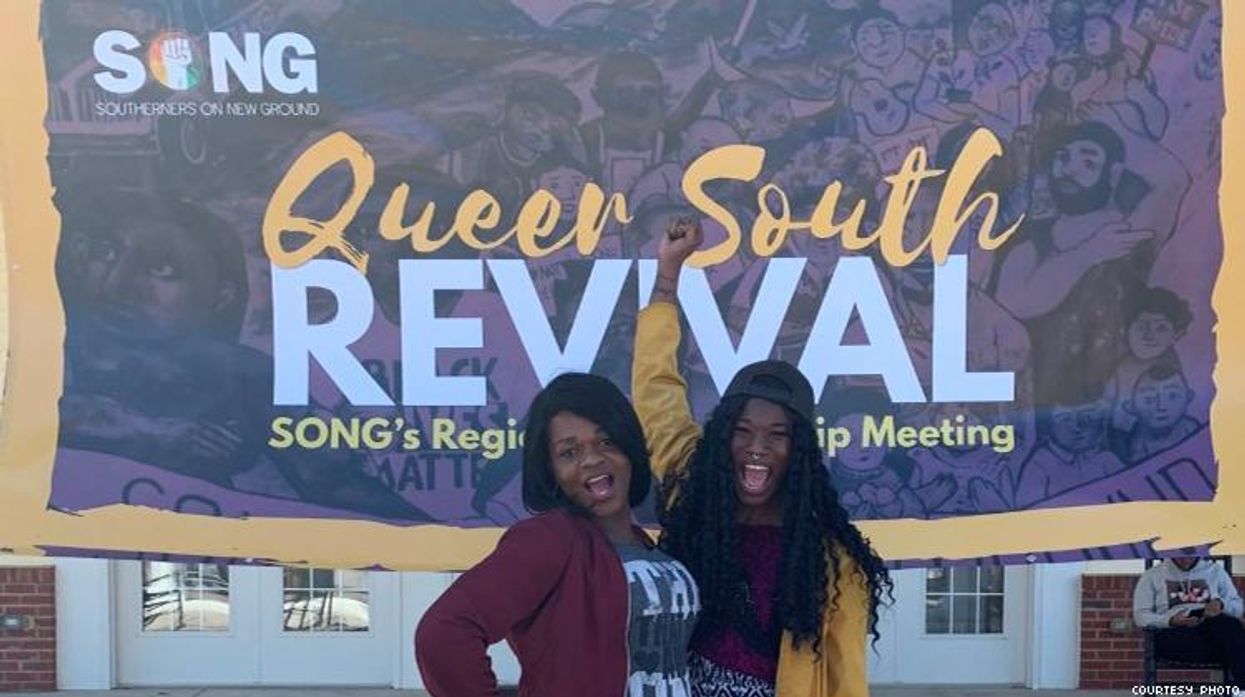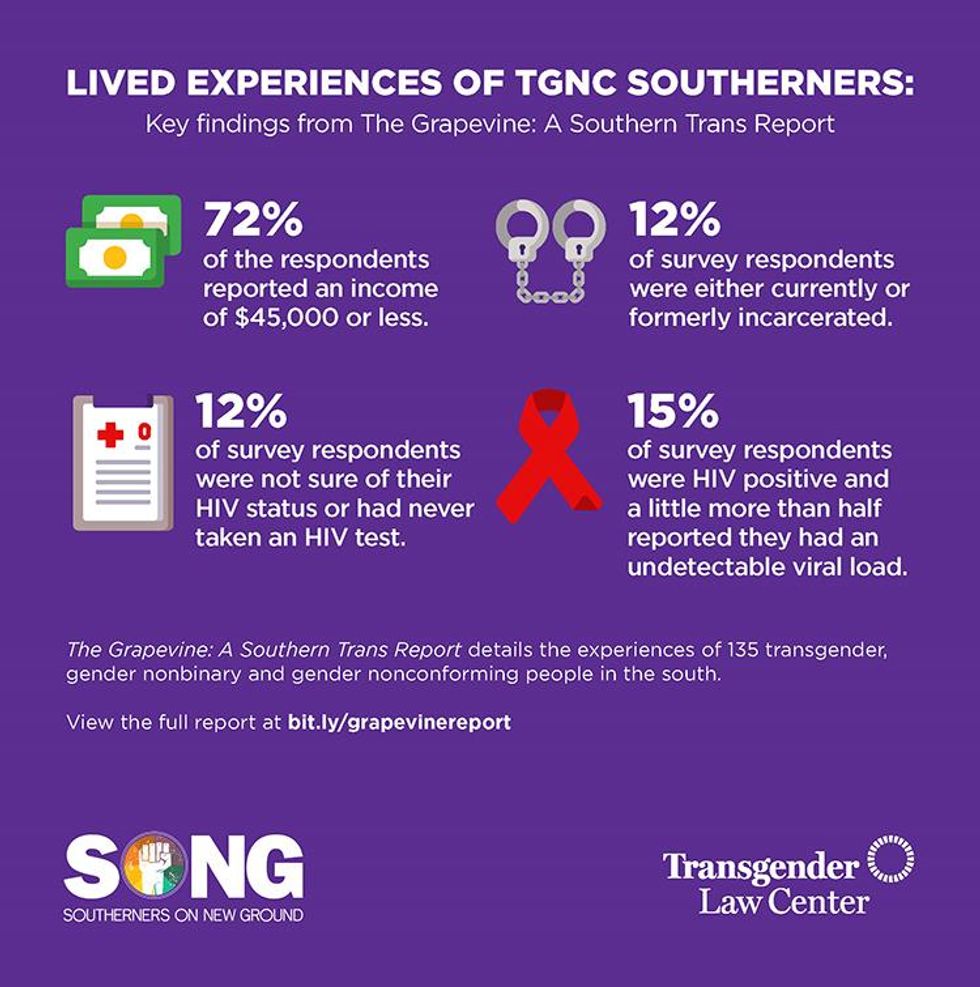The southern U.S. isn't known as a particularly friendly region for LGBTQ people. And trans people are known to experience more oppression than others in the LGBTQ population. But when you put the South and trans people together, the level of discrimination is staggering.
In The Grapevine: A Southern Trans Report, a new survey from the Transgender Law Center and Southerners on New Ground of trans and gender-nonconforming people in 13 southern state, 47 percent of respondents reported experiencing violence -- including harassment, discrimination, verbal, and physical violence -- from strangers. The number rose to 58 percent for trans women and those who identified as femmes. Forty-one percent reported experiencing these types of violence from law enforcement, and for participants of color, the number was 52 percent. Forty percent reported experiencing this behavior from health care providers.
"The findings show that we're being attacked on so many different levels," says Kayla Gore, southern regional organizer with TLC@SONG, a collaboration between the two organizations, in an interview with The Advocate.
For trans women of color, TLC consultant Mariah Moore tells The Advocate, "it's something we experience every day."
The survey was conducted in 2017 among 135 transgender, nonbinary, and gender-nonconforming people in, Florida, Georgia, Kentucky, Louisiana, Mississippi , Missouri, North Carolina, South Carolina, Tennessee, Texas, Virginia, and West Virginia. Most respondents answered online, but some did so in person at LGBTQ events.

In addition with but connected to the high levels of violence and discrimination, access to culturally competent health care is a major problem for trans people in the South. Even clinics focusing on health care for lesbian, gay, and bisexual people, or focusing on HIV, often fail trans people, says Gore, who is based in Memphis. "They don't have the necessary training to adequately provide care to transgender folks," she says. She adds that smaller clinics, particularly those dealing primarily with reproductive health care, are doing a good job of seeking out information on how to serve trans clients.
"The barriers to health care are very much real," Moore notes. Cultural competency is definitely a problem, she says -- for instance, when a client identifies herself as female, often the provider's next question is when she had her last menstrual period. Another problem is lack of a stable income to pay for health care, she says. Seventy-two percent of respondents to the survey reported an annual income of $45,000 or less.
Society wants trans people to be "good citizens," Moore says, but discrimination often keeps them from education and jobs that provide that stable income. "People have to understand that [trans] people can't prosper when we have policies and practices in place that keep them down," she says.
There are also the times when discrimination turns deadly or nearly so. Jazzaline Ware, a Black transgender woman, was found dead in her apartment in Memphis a little over a month ago, and her death is being investigated as a homicide, Gore says. Then last week in Southaven, Miss., just across the state line from Memphis, a trans woman was shot in both legs with an assault rifle while trying to drive away from a Waffle House restaurant, she says. The woman, whose name has not been made public, is still hospitalized, and one man has been arrested in connection with the crime.
Anti-trans sentiment is more intense in the South than in other parts of the country, in Gore's opinion. She attributes it partly to the religiosity of the region, generally conservative religiosity; the South is often called the Bible Belt, and Memphis is known as the buckle on it.
Moore, on the other hand, does not consider the South more anti-trans than other regions -- but, she says, Black trans people face the worst degree of discrimination and violence, and that's all over the U.S. Both she and Gore are Black trans women.
But none of the states in which the survey took place ban employment discrimination based on gender identity, or sexual orientation, for that matter, except for a few that have a policy in place covering public employees only. This year in Louisiana, the Louisiana Employment Non-Discrimination Act, which would have prohibited both public and private employers from discriminating on the basis of sexual orientation and gender identity, died in committee. And in several southern states, there continue to be attempts to enact "license to discriminate" laws, usually allowing places of business to legally refuse to serve customers by citing religious objections.
Also, in the nation today, there is transphobia emanating from the highest office in the land, with Donald Trump's plan to exclude trans people from the military, his administration's rollback of protections for trans students, his announced opposition to including LGBTQ people in civil rights law, a religious exemptions policy that threatens health care for trans people, and more. There has always been anti-trans bias in the U.S., but Trump has empowered those who hold that bias to express it ever more freely, both of the activists say.
The solution? Organize, organize, organize, the two women say. Trans and gender-nonconforming people need to share information with each other and with advocacy organizations, many of which have recognized the need to be trans-inclusive. Trans people need to be vocal, and others need to hear them.
The Grapevine report will help get those voices out there, the activists add. "I hope people will look at the report and see the disparities are real," Moore says.
For the full report, go to TransgenderLawCenter.org/grapevine.





































































Charlie Kirk DID say stoning gay people was the 'perfect law' — and these other heinous quotes